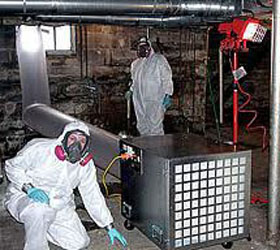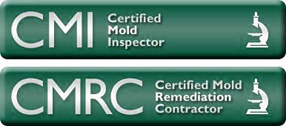Advanced Mold Remediation ServicesCertified Mold Remediation...Black Mold RemovalServing the Southern New Hampshire Area
|
|
Mold Removal & Mold Remediation Cleaning |
|
Note: Mold remediation is very case specific. Our treatments are tailored to the unique situation of each property. Sometimes elderly or sick people can't leave the premises. Some basements have flooding or moisture problems. Some attics have ventilation problems or ice dams. All these conditions will need to be considered before a proper mold remediation plan can be written.
Check
the attic roof for leaks after a heavy rain Health Effects of Mold
|
|
|
What mold symptoms
are commonly seen with mold exposure?
• Exposure to mold can produce adverse health effects
through inflammation, allergy, or infection. Allergic reactions
(often referred to as hay fever) are most common following mold
exposure. Typical symptoms that mold-exposed persons report
(alone or in combination) include: Respiratory problems, such as
wheezing, difficulty breathing, and shortness of breath Nasal
and sinus congestion • Eye irritation (burning, watery, or
reddened eyes) • Post nasal drip, dry hacking cough • Nose or
throat irritation • Skin rashes or irritation Headaches, memory
problems, mood swings, nosebleeds, body aches and pains, and
fevers are occasionally reported in mold cases.
How much mold
can make me sick?
It depends. For some people, a relatively small amount of
airborne mold spores can trigger an asthma attack or lead to other health
problems. For other persons, symptoms may occur only when
exposure levels are much higher. For other people the effects of
mold exposure are not acute, but develop over time. Nonetheless, indoor mold growth
is unhealthy and the mold can spread. Basically, if you can see or
smell mold inside your home, take steps to quickly identify and
eliminate the excess moisture and remove the mold
immediately.
Are some molds
more hazardous than others?
Allergic persons vary in their sensitivities to mold, both
as to the amount and the types to which they react. In addition
to their allergic properties, certain types of molds, such as
the infamous black mold type Stachybotris chartarum, may produce compounds that have toxic
properties, which are called mycotoxins. Mycotoxins are not
always produced, and whether a mold produces mycotoxins depends
on what the mold is growing on. Conditions such as temperature,
pH, humidity or other unknown factors play an important role.
When mycotoxins are present, they occur in both living and dead
mold spores and may be present in materials that have become
contaminated with molds. While Stachybotrys is growing, a wet
slime layer covers its spores, preventing them from becoming
airborne. However, when the mold dies and dries up, air currents
or physical handling can cause spores to become airborne. At
present there is no environmental test to determine whether
Stachybotrys growth found in buildings is producing toxins.
There is also no blood or urine test that can establish if an
individual has been exposed to Stachybotrys chartarum spores or
its toxins.
Who is at
greater risk when exposed to mold?
Exposure to mold is not healthy for anyone inside
buildings. Therefore, it is always best to identify and correct
high moisture conditions quickly before mold grows and health
problems develop. Some people may have more severe symptoms or
become ill more rapidly than others: • Individuals with existing
respiratory conditions, such as allergies, chemical
sensitivities, or asthma. • Persons with weakened immune systems
(such as people with HIV infection, cancer chemotherapy
patients, and so forth) • Infants and young children • The
elderly, anyone with health problems they believe are due to
molds should consult a medical professional. Additional fact
sheets on Mold and Health Effects are available from CDHS: •
Health Effects of Toxin-Producing Molds • Stachybotrys
chartarum (atra) ‹ a mold that may be found in water damage
homes. • Fungi and Indoor Air Quality • Misinterpretation of
Stachybotrys Serology
Advanced Mold Remediation Services
Brookline NH, Mason, Greenville NH..
New Ipswich NH, Hollis NH, Wilton NH..
Milford NH, Litchfield NH, Amherst NH..
Merrimack, Derry NH, Londonderry NH..
Hampstead NH, Seabrook, Hampton NH..
Hampton Falls, N. Hampton NH, Rye NH..
Greenland NH, Stratham NH, Exeter NH..
Kensington, Newton NH, Brentwood NH..
Fremont NH, Danville NH, Atkinson NH..
Sandown NH, Chester NH, Kingston NH..
Manchester NH, Epping NH, Fremont NH..
Raymond NH, Candia NH, Auburn NH..
Concord NH, Allentown NH,Brentwood NH..
Pembroke NH, Hooksett NH, Bow NH..
Goffstown NH, Bedford NH, Nashua NH..
Windham NH, Hudson NH, Pelham NH..
Plaistow NH, Salem NH, Plaistow NH..
- For all your Pest Control Needs Go To
- Security Pest Control for Carpenter Ant & Termite Control
 Certified
Mold Remediators
Certified
Mold Remediators
